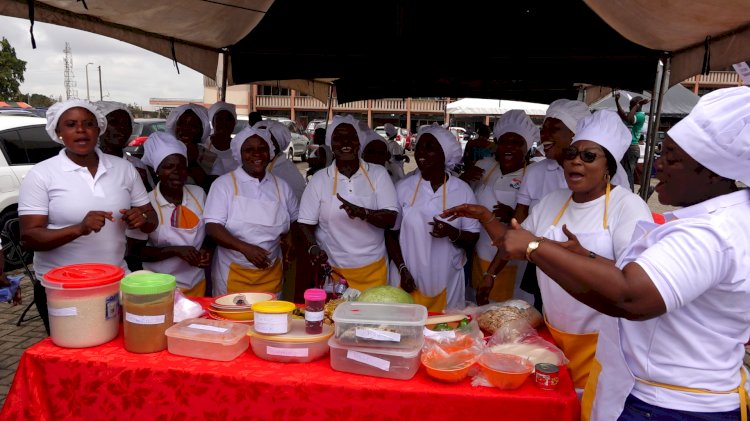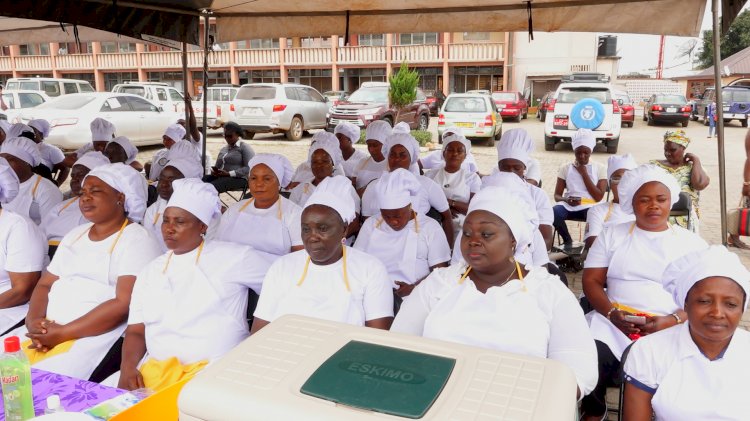GSFP and AUDA impact Head Cooks and Caterers of School Feeding Program on World Food Day
The programme was proposed by the GSFP to host and educate caterers under the school feeding program policy on the provision of nutritious meals for school children hence the subject; Innovative Nutrition Training for Ghana School Feeding Caterers.

The Ghana School Feeding Programme (GSFP) in collaboration with the African Union Development Agency (AUDA) have productively honored the World Food Day in the Ashanti Region at the Jubilee Park, Kumasi today, October 16, 2019.
The programme was proposed by the GSFP to host and educate caterers under the school feeding program policy on the provision of nutritious meals for school children hence the subject; Innovative Nutrition Training for Ghana School Feeding Caterers.
The World Food Day is celebrated on October 16 every year with the aim of promoting worldwide awareness and action for those who suffer from hunger. This year’s, themed; “Healthy Diets for a Zero Hunger World” articulates on the need to ensure healthy diets for all especially children.
The school feeding program is a broad and specific course employed by government to improve school enrolment and promote an increase in domestic food production for the various primary schools in the country.
READ ALSO:
Atwima Nwabiagya North District CELEBRATE International Day for Girl Child
GUTA cautions Government on plans to CRIPPLE Businesses in the Ashanti Region
It has suffered criticism from some political leaders, parents and guardians since it inception with the charge that meals prepared for children are 'malnutritioned' and insufficient for their consumption. The GFS and AUDA as part of reasons found it demanding to keep in shape the head cooks and caterers through the preparation of nutritional meals to enrich and improve the diet of children under the program.

According to the Senior Nutritional Manager of the African Union Development Agency (AUDA) and NEPAD, Mrs. Kefilwe Moalosi, Ghana is the leading country within the A.U Member countries to implement the school feeding program. She applauded the immense effort of the government’s in terms of promoting and sustaining the homegrown school feeding program. She revealed that the government’s tremendous and incredible ways of linking farmers to improve the school meals is a remarkable approach for the well-being of the Ghanaian children.
“I have seen so much indigenous crops such as the palm nuts, cassava… and these are the indigenous knowledge that we want to promote the SAUDA going forward that we can actually embrace our indigenous foods. We should go back to our traditional food and give it back to our children and as you know, we have to make sure to provide our school going children nutritious and healthy food to enable them the food substances that we have,” she said

She defined Ghana’s homegrown school feeding program as inclusive and comprehensive. The involvement of the caterers, pupils and farmers was acknowledged as an innovative approach, which can be showcased in the whole of Africa.
Mrs. Moalosi urged the country administrators to improve the infrastructure of school feeding i.e. providing the school kitchens and ensuring that there is safe and quality meals for students.
“Next time I come to Ghana I want to see dining facilities so that our children can enjoy the healthy nutritious meals in their kitchens"
“The cooks are doing a wonderful job by providing healthy meals to our children we are here because of them as well,” she added.

She further advised that achieving zero hunger is not about filling the stomach but providing the right meal for the children in order to overcome non-communicable diseases in the environment.
“We have more than 42 percent of total death caused by NCD’s. These contribute to lot of death in Ghana so we have to make sure we have our healthy diet, we sustain our food system and we make good use of our local produce foods. You are blessed to have so much rain, you have fertile soil, indeed Africa can feed itself,” she said.
The caterers were taken through ways of using Soy to prepare the local Ghanaian dishes like Kokonte, Banku, Waakye, Cassava leaf stew, Banku fortified with Soy with pepper and fish on the school’s meal menu.

The Director of Operations of the Ghana School Feeding Program, Mrs. Dora Ntuka Gaba explained the nutritional significance of Soy and encouraged caterers to use them to prepare meals for pupils.
She addressed that head cooks and caterers would be given certificate of participation as a form of endorsement after the event in order for the GSFP to monitor and dismiss caterers who make up unhealthy meals in their various schools.
“The Honorable Minister (Minister of Gender, Children and Social Protection) Mrs. Cynthia Morrison has been able to acquire funding to train 3,327 caterers and head cooks in the Ashanti Region. They are all going to be certified so please pay attention and make sure you do the right thing”
“We will also make sure that the monitoring for all our school activities are intensified and caterers who do not cook well are dismissed. So today is a new starting life for all caterers in the Ashanti Region,” she added.

The Chief Executive Officer of Boris B Farms and Veterinary Supplies Ghana Limited, Mr Boris Baidoo together with a few poultry farming officials presented 1,500 eggs to support the training programme. He spoke that farmers are willing to assist the School Feeding programme therefore their doors are always open whenever government call for their service.
Cultural groups from schools in the Ashanti Region entertained guests with traditional music and dance at the program before the prepared foods were inspected by officials.





































